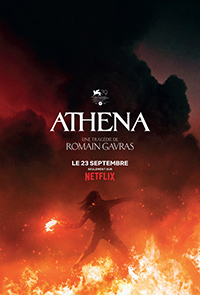The World is (Not) Yours: Gavras Clumsily Tackles Civil Unrest, Police Brutality
 Recalling elements of his father Costa-Gavras’ most iconic film, Z (1969), Romain Gavras stages one hellish night of urban civil war inspired by a suspicious murder in Athena. Bearing striking tonal and thematic similarities to Ladj Ly’s Les Miserables (2019), who also co-wrote the script, it’s titled after the Greek goddess of war, transplanting the essence of mythical warmongering onto contemporary social ills, with families torn asunder, brother facing off against brother. In his third narrative feature, Gavras hits the ground running with an explosively staged opening, never letting up as uncivil disobedience accelerates rapidly into all out civil war in a fortification of an eponymously named French housing project.
Recalling elements of his father Costa-Gavras’ most iconic film, Z (1969), Romain Gavras stages one hellish night of urban civil war inspired by a suspicious murder in Athena. Bearing striking tonal and thematic similarities to Ladj Ly’s Les Miserables (2019), who also co-wrote the script, it’s titled after the Greek goddess of war, transplanting the essence of mythical warmongering onto contemporary social ills, with families torn asunder, brother facing off against brother. In his third narrative feature, Gavras hits the ground running with an explosively staged opening, never letting up as uncivil disobedience accelerates rapidly into all out civil war in a fortification of an eponymously named French housing project.
Some spectacularly choreographed battle sequences between irate residents inflamed over a viral video of a thirteen year-old beaten to death by men wearing police uniforms, and the grimly determined, unstoppable law enforcement factions attempting to restore order, makes for captivating viewing. Unfortunately, in its eventual lulls, a pile-up of one note characterizations and a cluster of conveniences diminish the potent social issues it contends with.
Mere hours after a viral video showing a thirteen year old Idir being beaten to death, one of his elder brothers, Abdel (Dali Benssalah), who is also a policeman, announces an investigation is underway, urging nonviolence at a scheduled rally. Before he can finish his speech, his younger brother Karim (Sami Slimane) launches a Molotov cocktail into the crowd of law enforcement officer and a legion of youths from their neighborhood infiltrate the police station, absconding with a locker full of semiautomatic weapons they take back with them to the Athena, their main apartment complex in the projects, already barricaded and locked down in anticipation for a standoff with police. Karim serves as the movement’s fast growing ring leader, demanding Idir’s killers be named immediately or else more violence will occur.
With all the denizens of the Athena forced to stay inside, chaos ensues, and their eldest brother, Moktar (Ouassini Embarek), a local drug dealer with powerful connections, is desperate to remove his goods from the area, trapped inside with everyone else. As Abdel attempts to reason with Karim, assisting in fashioning a convoy to allow innocent women and children leave the newly erected war zone, an abducted police officer (Anthony Bajon) allows them more leverage in their demand for Idir’s killers. But violence has a unique way of swaying people’s values.
Gavras, whose underrated and unique debut Our Day Will Come (2010) remains his most innovative film to date, pushes similar themes visited in his comically inclined The World is Yours (2018). However, the film plays like the more explosive, less preachy cousin to Ly’s previous film, replete with a vicious stand off in the projects. Unfortunately, like Ly, Gavras (and co-scribe Elias Belkeddar) can’t quite seem to trust the intelligence of their audience, removing any sense of ambiguity by confirming everything it hints at. The inclusion of a somewhat sympathetic white police officer, as in Les Miserables, feels a bit unnecessary, especially considering it’s almost immediately apparent what’s going to happen with Anthony Bajon’s Jerome based even on the slightest of details we’re fed about him. More interesting are the trio of surviving brothers, each with a significantly different agenda.
Dali Benssalah’s (a supporting villain in the recent No Time to Die, 2021) Abdel is meant to be the heroic voice of reason, a man straddling both sides as a member of the community and a policeman (how this alliance is ultimately tested and compromised is one of the film’s most clunky segues), while oldest brother Moktar is ruthless in his selfish detachment.
Making his debut, Sami Slimane cuts the most striking figure as ringleader Karim (his fierceness recalls Julie Ledrou’s similar energy from this year’s Rodeo). More time teasing the differences between them and their ideologies and desires, like Zeus and his brothers, would have allowed Gavras’ metaphors greater heft in this frenetic battleground. Instead, characters get pulled out like mindless weapons from an arsenal, such as Sebastien (Alexis Manenti), introduced early on to be trotted out like a cannon, an ace at gardening and arson.
While its third act reduces the film to something a bit more generic and elementary in this particular genre, along the lines of the Danish film Entrapment (2020), there’s an undeniable kineticism and vitriol captured in some undoubtedly impressive moments of mayhem. Instead, it’s a film reveling in miserabilism, obsessed with its own internally combusting tragedy, like the doomed playthings of the mythical Greek gods it’s evoking.
Reviewed on September 2nd at the 2022 Venice Film Festival – In Competition. 97 Mins
★★½/☆☆☆☆☆


